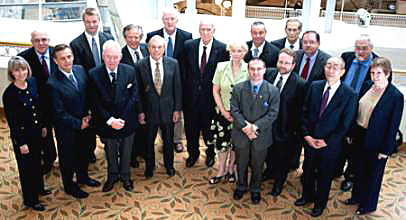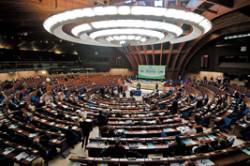 Passive hydrogen maser atomic clock of the type flown on Galileo, accurate to one second in three million years. ESA photo.
Passive hydrogen maser atomic clock of the type flown on Galileo, accurate to one second in three million years. ESA photo.Speakers at last month’s 9th Annual Conference on European Space Policy in Brussels wasted no time in addressing the somewhat worrying failure of a number of Galileo onboard clocks, as revealed by European Space Agency Director General Johan-Dietrich Woerner at a press briefing earlier in January in Paris. He made clear at the time that the clock failures, while indeed troubling, had had no effect on the operational integrity of the Galileo system.
Speakers at last month’s 9th Annual Conference on European Space Policy in Brussels wasted no time in addressing the somewhat worrying failure of a number of Galileo onboard clocks, as revealed by European Space Agency Director General Johan-Dietrich Woerner at a press briefing earlier in January in Paris. He made clear at the time that the clock failures, while indeed troubling, had had no effect on the operational integrity of the Galileo system.
Certain sources, however, seemed to want to jump on the clock story as yet another confirmation of a misguided and failed approach of the entire Galileo program, if not the entire European Union. Reactions from some quarters involved crying out, “There they go again, another gaff for Galileo!”, and then watching as the relevant officials squirmed.
Yes, curious as it may seem, there are some people who enjoy watching European officials squirm.
But there was no squirming at the conference in Brussels. Elzbieta Bienkowska, European Commissioner for single market, industry, entrepreneurship and SMEs, confirmed Woerner’s assessment of the operational status of all Galileo satellites, and not before reminding the assembly of the successes of 2016, including the first-ever four-at-a-time launch last autumn, and the successful declaration of Galileo initial services in December.
“A number of clocks have failed," Bienkowska said. "Every large scale project, in particular technology-intensive ones, face high risks. Galileo is no exception. Such things can happen, as we learned also from the experience of other navigation satellite systems. This is why we have four clocks onboard each satellite, to cope precisely with clock failures. To work properly, a satellite needs only one clock. All the satellites in orbit to deliver initial services are operational.
"We are monitoring very closely the situation," she said. "As always, on technical issues, the Europe Space Agency (ESA) is leading an in-depth technical investigation of the clock failures and is already implementing corrective actions together with the industry."
So, the common message coming out of ESA and the European Commission (EC) is, in short, ‘smooth sailing’. The policy of installing more clocks than needed seems to have paid off. Despite the failed clocks, which number about six, all of the orbiting Galileo satellites still have at least two functioning clocks.
Bienkowska said she has recommended the setting up of a joint steering group chaired by the EC, along with industrial partners and the ESA, to look into the clock failures and then make clear policy and industrial recommendations.
And clear policy recommendations are pertinent, because, as we know, Galileo is not just a technology program but a policy-driven program. It was Woerner who said during his press briefing in Paris that the decision to install the now-failing but more importantly ‘made-in-Europe’ rubidium clocks onboard Galileo was a political decision, not a technical one, linked to the central EU policy goal of maintaining European autonomy in space.
Woerner also granted that while no orbiting satellite has been rendered inoperable due to a clock failure, impending launches could be delayed as the investigation plays itself out.
Later, Bienkowska insisted on the important role of space, including Galileo, in European security and defense, of which we will hear more later. She concluded by encouraging, among other things, "…faith in the added value of Europe…" and she called space, "…one of these – maybe the only one of these – concrete and positive examples of what we can do together in Europe."
Brexit
The breaks in between conference sessions featured much chatter about recent events, it being the new year and all, when people like to take a deep breath, look back and look forward. Brexit and the election of a new American president were on people’s tongues, with tones varying from amused to frustrated to nearly passionate. Everyone’s got a right to their opinion.
And the topic of Brexit also spilled onto the podium, with several speakers specifically alluding to ‘what’s happened’, not without the urging of at least one mischievous session moderator.
European Member of Parliament from Britain Clare Moody got the ball rolling, explaining to the conference why she thought Britain should have stayed in the EU: "We are united in diversity. It is by working together that we can achieve success in our endeavors in space. It is as a British MEP that I particularly recognize and cherish our ability to combine our efforts."
Moody reminded participants of what she had said at the same conference a year ago: "I said then that space policy was one of the very many good reasons that the UK should have stayed – should stay – in the EU. My view on that hasn’t changed, although you may have noticed that the politics have gotten a little bit more tricky back in the UK."
Moody continued on the theme of world politics, saying, "Space is where we work with countries that we sometimes find it more difficult to work with here on Earth." She was also happy to note that the ESA had endorsed the new EU Space Strategy and that the European Commission sees the ESA as, "…a valuable, full and equal partner in developing space programs."
This is an important point indeed for Great Britain, whose membership in the ESA, if not in the EU, will ensure its continued presence in big-league European space projects such as Galileo.
During a question-and-answer session on space services integration, Jadwiga Emilewicz, Undersecretary of State for the Ministry of Economic Development of the still relatively young EU Member State Poland, was asked about the impact of Brexit on European space policy. "Thank you for the question which is not very directly connected with the topic of our discussion," she responded, to the delight of some listeners, "although Brexit is interfering on almost every single discussion within the European Union."
Brexit is important, Emilewicz said, but it will not interfere with the goals of Europe’s space policy. "I would say that if we want to achieve those ambitious goals, it could not be achieved without the active role of the United Kingdom," she stated.
For his part, Woerner, during his press briefing in Paris the previous week, had already addressed the question of Britain’s self-removal from the European Union. “ESA is an intergovernmental organization, so we are not part of the EU, so therefore there is no direct impact. The UK has clearly indicated that their membership in ESA is not in question. It’s more or less the opposite; they are increasing their contribution strongly.”
So, there is no immediate impact on Galileo, Woerner said. "We will see what happens in the future and how the UK and the EU really define the details, but for us the relationship with the United Kingdom is of very great importance, so we will do our very best to see that their Brexit does not have some negative influence on the space sector."
Back to Galileo
Participants were pulled back to the meat of the meeting by ESA Director of NAV Paul Verhoef, who hailed ever closer and ever more satisfactory cooperation between his Agency, the European Commission and the European GNSS Agency (GSA).
He said about the launch of Galileo initial services, "It shows the world that we are progressing. Obviously, for many years there has been an undertone of ‘this system which is costing too much and it is too late’. So, I think that we have now put this behind us; the event in December was fantastic, also because it was mentioned around the world."
Verhoef said ESA’s United Space of Europe and Space 4.0 initiatives, and the EC’s new Space Strategy are all moving in the right direction, with the future focus on applications and integration of space services with terrestrial technologies. He cited the example of autonomous driving as one area where Europe can and should be moving forward very rapidly, working to integrate space-based navigation and Earth-observation services, a variety of ground-based technologies, the world of sensors, and all of the traditionally non-space user communities.
It is important, Verhoef said, for the space sector to put itself forward, to provide better access to the space technologies that can make this integration happen. To this end, he said, "We are trying to set up a common front office, if you will, between the application areas of navigation, communication and Earth observation, supported by our technical people at ESTEC (European Space Research and Technology Centre, Noordwijk, Netherlands), in order to offer a way into the ESA system for those who think that space can offer a contribution to their solution.
"So from our side," he said, "we are trying to reposition ESA in this new world. We have a sector that is confident in its capabilities and open to the challenges that lie ahead."
Finally, it was GSA Executive Director Carlo des Dorides who drew all the strands together, emphasizing the importance of public support, the rapid adoption of Galileo services and their integration into a multi-GNSS and multi-system environment, as well as the development and economic exploitation of useful applications.
For des Dorides, the role of the GSA now is to make the European Space Strategy concrete, in a future where Galileo and GNSS will be, "…one element of an overall multi-system, providing positioning and navigation, so the answer will not be GNSS only."
The new emerging paradigm for navigation and positioning, he said, has ubiquity as a key element. "Navigation and positioning data must be available with seamless continuity wherever it is needed, so urban canyons, mountains, tunnels, in the parking area, in the garage," des Dorides said.
Positioning data must be robust and secure, he said, and there will be a new emphasis on “ambient intelligence.”
"This is the capacity to interact with the external world, and, more and more, between users," des Dorides said. That includes human users but also things, the internet of things, which, across the globe, already includes more connected things than connected people.
In sum, the 9th Annual Conference on European Space Policy saw leaders and members of various space-linked communities taking stock, discussing challenges and sketching a future based on strong cooperation and united effort, with an eye towards but not cowed by the “interesting times” we live in. More news from the conference will be included in the March-April 2017 issue of Inside GNSS.





